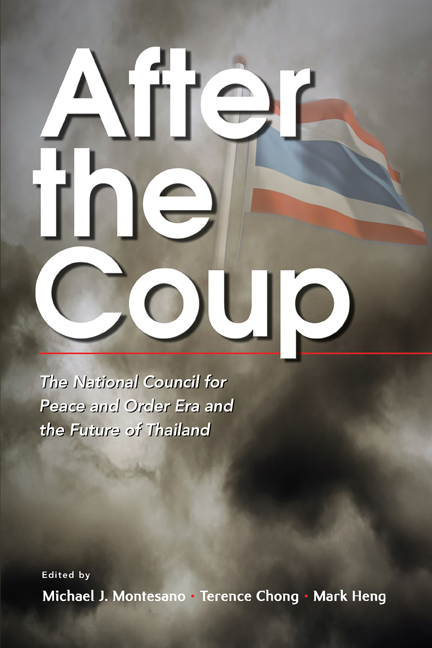Book contents
- Frontmatter
- Contents
- About the Contributors
- 1 Introduction: Thai Realities and Possibilities after the 22 May Coup
- 2 The Rise of the Thai Upper Middle Class and its Turn against Democracy
- 3 “We the Southerners Come to Protect the Nation and the King”: Southerners’ Political Rise and Regional Nationalism in Thailand
- 4 Exit, Voice, (Dis)loyalty? Northeast Thailand after the 2014 Coup
- 5 The Red Shirts and their Democratic Struggle in Northern Thailand, April 2010 – May 2015
- 6 The Shifting Battleground: Peace Dialogue in Thailand's Malay-Muslim South
- 7 Thailand's Zigzag Road to Democracy: Continuity and Change in Military Intervention
- 8 Murder and Regress: Violence and Political Change in Thailand
- 9 Thailand's Politics of Decentralization: Reform and Resistance before and after the May 2014 Coup
- 10 Change and Continuity in the Politics of the Media after the Coup
- 11 Thailand's Royal Democracy in Crisis
- 12 The Foreign Press and its Changing Perceptions of the Thai Monarchy
- 13 Thai Economic Growth: Retrospect and Prospect
- 14 Features and Challenges of an Ageing Population in Thailand
- 15 Conclusion: Thailand in Transition
- Bibliography
- Index
15 - Conclusion: Thailand in Transition
Published online by Cambridge University Press: 23 May 2019
- Frontmatter
- Contents
- About the Contributors
- 1 Introduction: Thai Realities and Possibilities after the 22 May Coup
- 2 The Rise of the Thai Upper Middle Class and its Turn against Democracy
- 3 “We the Southerners Come to Protect the Nation and the King”: Southerners’ Political Rise and Regional Nationalism in Thailand
- 4 Exit, Voice, (Dis)loyalty? Northeast Thailand after the 2014 Coup
- 5 The Red Shirts and their Democratic Struggle in Northern Thailand, April 2010 – May 2015
- 6 The Shifting Battleground: Peace Dialogue in Thailand's Malay-Muslim South
- 7 Thailand's Zigzag Road to Democracy: Continuity and Change in Military Intervention
- 8 Murder and Regress: Violence and Political Change in Thailand
- 9 Thailand's Politics of Decentralization: Reform and Resistance before and after the May 2014 Coup
- 10 Change and Continuity in the Politics of the Media after the Coup
- 11 Thailand's Royal Democracy in Crisis
- 12 The Foreign Press and its Changing Perceptions of the Thai Monarchy
- 13 Thai Economic Growth: Retrospect and Prospect
- 14 Features and Challenges of an Ageing Population in Thailand
- 15 Conclusion: Thailand in Transition
- Bibliography
- Index
Summary
As tourists to Bangkok hurtle down the highway from Suvarnabhumi Airport into the city, one particularly forbidding sign will flash by them. Written both in English and Thai, it says, “It is wrong to use Buddha as a decoration or tattoo. Means no respect [sic]. Don't buy or sell Buddha.” This is perhaps no surprise, given the status of Buddhism as the country's de facto national religion, not to mention the ubiquitous commodification of Buddha images for all manner of business from bars and bistros to club music and fashion. So one may be forgiven for believing that the government is serious about clamping down on the crass popularization and export of Buddhist iconography. After all, it strictly prohibits the export of any Buddha images without written permission while imposing an export ban on parts of Buddha such as the head, hands or feet (Bangkok Post, 30 June 2013). Moreover, although trinket-sized images do not require government permission for export, only a maximum of five pieces are allowed per person. Not least, such rulings have firm footing in the legitimate need to prosecute looters who remove pieces from Buddhist monuments and archaeological sites around the country.
However, later that evening, as the very same tourists stroll down Sukhumvit Road or traverse cavernous shopping purgatories like MBK Centre, it will become strikingly obvious that Buddha statues of varying sizes are as popular as $20 Rolexes and even cheaper aphrodisiacs lining the streets. Buddha heads the size of watermelons for your dining table, Buddha masks for your wall, Buddha paintings in colour or black and white, Buddha smiling, laughing, lying prone, in wood, bronze, silver, on t-shirts, are arranged openly for your perusal. Asking your friendly neighbourhood vendor if her Buddha products have had prior approval from the government will win you, at best, a patronizing smile or, at worse, a derisive snort. Furthermore, if you are brave enough to test her patience even further, you can ask whether they know where to seek export permits for your purchase.
By the end of the evening, our tourist friends will have realized two things. First, there are sensible rules and regulations in Thailand. Many may have strong rationales behind them and are, for the most part, well thought out. This culture of bureaucracy is evident in almost every part of Thai society, even when the country is in political transition.
- Type
- Chapter
- Information
- After the CoupThe National Council for Peace and Order Era and the Future of Thailand, pp. 381 - 388Publisher: ISEAS–Yusof Ishak InstitutePrint publication year: 2019

